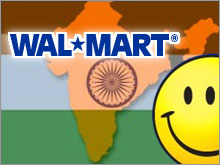|
Wal-Mart's dilemma in India
The No. 1 retailer is eager to set up shop in the subcontinent, but local regulations still pose a challenge to its entry strategy.
NEW YORK (CNNMoney.com) - Wal-Mart's itching to get into India, but it won't be easy. India is already Wal-Mart's fastest growing sourcing market. More significantly, the world's largest retailer has identified India, the second most-populous nation and fourth largest retail market, as a huge organic growth opportunity for Wal-Mart (Research) in the future as its home market becomes increasingly saturated.
So what's the hold up? The dilemma for Wal-Mart is India's complex foreign direct investment, or FDI, regulations, which currently bar international retailers from directly entering the Indian market. In other words, international retailers who have set up shop in India have opted for franchising deals with local partners or entered into joint-venture partnerships with Indian companies. The Indian government did somewhat relax its FDI rules earlier this year, allowing "single-brand" retailers such as Nike or Gucci to own 51 percent of their business operations in India. However, this still precludes Wal-Mart, since the retailer sells a variety of brands in its stores. At least one retail industry analyst suggests there could be another option -- and perhaps a more desirable one -- for Wal-Mart if it is determined to speed up its India entry despite the FDI obstacles. Anil Rajpal, associate director of retail with global consulting firm KSA-Technopak, the Indian subsidiary of Kurt Salmon Associates, said Wal-Mart might want to consider a joint-venture-wholesale model in India. "For example, one way to circumvent the existing FDI provisions if it considers opening Sam's Club wholesale stores in India with a joint venture and sell only to business clientele and not individual consumers," Rajpal said. "This way, Wal-Mart is not operating in the consumer retail market but at least it has got its foot in through the door." According to Rajpal, German retailer Metro AG, which operates wholesale stores, supermarkets and department stores, entered India two years ago and set up two "cash-and-carry" stores in India that sell strictly to business customers. Metro spokesman Albrecht Von Truchsess confirmed to CNNMoney.com that the company did set up two "cash-and-carry" stores in India in 2004. "We prefer to enter new countries with this format because it's an easier format to operate in the early stages of our entry. Secondly, with the cash-and-carry stores, we also not competing directly with other retailers," Von Truchsess said. "One other problem we faced in India is that the regional governments are very strong politically," said Von Truchsess. "So even if your company has national license to operate anywhere in the country, you'll still need to get approved for a regional license on top of the national license." Would Wal-Mart consider coming to India first with Sam's Clubs that cater only to a business clientele? "We could enter the market in that manner but we haven't made any decisions just yet," said Bill Wertz, director with Wal-Mart's international corporate affairs. Wertz said Wal-Mart executives were in India earlier this month. "We are keen on India and we already have two offices there to help us better understand the opportunity," he said. "We are talking to a lot of people and potential partners. We will go in one way or another but right now we're in the research and evaluation stage." -------------------------------- Under fire, Wal-Mart prepares schmooze fest. Click here to read more. Wal-Mart cautious about new year. Click here for more. Who's leeching off Wal-Mart? Click here. Wal-Mart, Kroger, Safeway better watch out. The British are coming! Click here for more.
Wal-Mart's challenge in China. Click here to read more |
|

